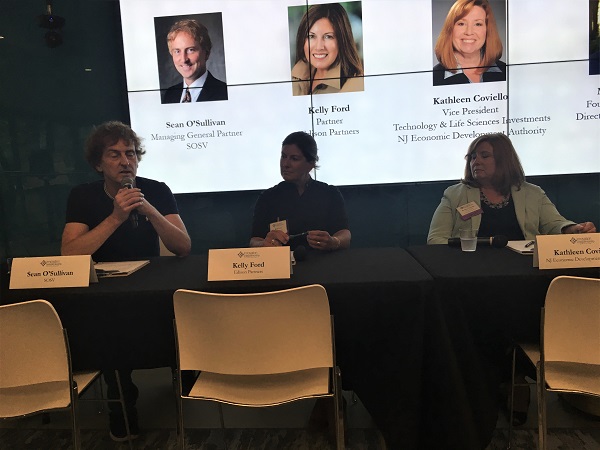Panelists Talk About Markets, Runaway Valuations at Princeton Pitchstop Event
On August 1, the Princeton Mercer Regional Chamber held its inaugural Princeton Pitchstop event.
The event, designed to encourage startups to stay in the Princeton area, featured a panel discussion on angel and venture-capital investment trends moderated by Mario Casabona, founder and CEO of Casabona Ventures and TechLaunch (both in Kinnelon). The panelists then served as judges for the three startups who pitched that evening.
Apart from Casabona, the panel included two representatives of venture capital/private equity firms: Sean O’Sullivan, managing general partner of SOSV (Princeton), and Kelly Ford Buckley, a partner at Edison Partners (Princeton); as well as Kathleen Coviello, vice president of technology and life sciences investments at the New Jersey Economic Development Authority (NJEDA).
Some takeaways from the panel discussion:
- SOSV deems food technology to be an interesting area for investment, including cellular architecture and “milk” that has been developed from proteins rather than taken from cows.
- “We see this as a big megatrend over the next 20 years,” said O’Sullivan. “If you can produce milk that is a higher-quality milk, but has less impact on the environment,” it will be a win-win for all.
- Another big trend is connected devices, including those using artificial intelligence and machine learning, as these technologies can be applied to the huge data sets created by connected devices.
- “When you are investing in the early stages as a VC, you have to be thinking 10 years ahead, as that’s how long your money will be tied up,” O’Sullivan said.
- A piece of advice: Don’t invest in something that looks as if it will be important in the next year or two, as that means you won’t have an exit opportunity in the next year or two.
- Buckley said that this economic environment is scary. “There is so much capital sloshing around, the valuations are really high and maybe some of the prices shouldn’t be that high,” she stated.
- VCs need a level of awareness, she said. “You can be excited by a market, but because we are in this capital-rich environment, we have to be careful as a VC and also as a CEO and founder about the expectations” that go with high valuations.
- Ultimately, it’s not about the first rounds, but about the longer journey, and CEOs and investors need to “check themselves” against this crazy dynamic, she added.
- Coviello noted that the NJEDA is seeing startups offering many new ways to farm and deliver the best fruits and vegetables. “We debate as to whether these companies are biotech or tech companies,” she said.
- There is also the creation of new artificial materials, including one that can replace leather, developed by Modern Meadow [Nutley], she noted.
- “On the personalized medicine side, we are seeing innovations on the manufacturing level and on the wearables level,” she said. “Everything about personalized medicine is trending in the state of New Jersey.”
- O’Sullivan said that valuations are totally dependent on how much money a startup can raise. “So, if you can raise $10 million, the valuation will be between $30 and $60 million. If you can raise $2 million, your valuation is going to be a fifth of that.
- These days, raising Series A funding requires either $2 million in revenue or a huge amount of traction. In the life sciences, you can get away with not having that, but there has to be huge amounts of scientific traction.
- The amount of money you can raise, and thus the valuation, will be higher in San Francisco than in the rest of the United States.
- New York and Boston are also good markets for raising money.
- Remember that even though New Jersey isn’t a low-cost state, the cost of doing business here is much less than in San Francisco, and this will affect New Jersey startup valuations.




